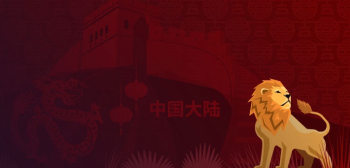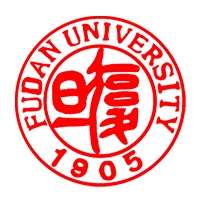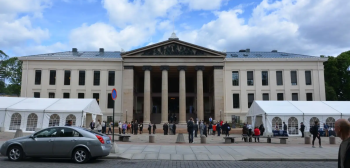复旦大学
About
Ask any would-be Chinese undergraduate where they most would like to study, and chances are Fudan will be mentioned. Based in downtown Shanghai amid the bustle and beauty of this urban metropolis, Fudan is one of China’s most prestigious and selective schools.
It was founded in 1905 shortly before the end of China’s imperial Qing dynasty. The two Chinese characters that make up the name of the university are taken from Confucian philosophy and mean “heavenly light shines day after day” – an indication of the school’s high ideals and aspirations.
Throughout China’s travails during the 20th century, from the Japanese invasion in 1937 to the Cultural Revolution, Fudan University has been a constant presence, evolving with the times into a modern, comprehensive-style university.
It has over 45,000 Chinese students on its books, and an additional 1,750 from overseas – the second highest total nationally. Students study in 17 schools and 69 departments, and the university confers 73 bachelor's and 201 master’s degree programs across a wide range of disciplines. It’s consistently ranked among the top five universities in China.
Most students live and study at the main Handan campus. Life on campus is acknowledged as an important part of students’ personal development, and as such there are a wide range of clubs – 310 student clubs in total, including 260 undergraduate organizations, 30 graduate student clubs, and 19 international student clubs. Some have a long history, such as the Fudan Opera Troupe, established in 1925, or the Painting and Calligraphy Society.
Volunteering in the community has also become an important part of student life, with more than 50 college and department volunteer service teams. After the Wenchuan earthquake, 1,077 volunteers from Fudan were part of disaster relief teams, and another 1,300 students volunteered at the Beijing Olympic Games, Paralympics, and World Aquatics Championships.
Fudan is beginning to spread its tentacles over the world, with academic exchange programs and partnerships with more than 200 universities and research institutions, including Harvard, Columbia, and the London School of Economics.
Its alumni are prominent politicians, artists, and scientists who have excelled in their fields, and include the director of the World Bank, Zhang Shengman, as well as Chen Zhongwei, a pioneer of the process of reattaching severed limbs.
About
Ask any would-be Chinese undergraduate where they most would like to study, and chances are Fudan will be mentioned. Based in downtown Shanghai amid the bustle and beauty of this urban metropolis, Fudan is one of China’s most prestigious and selective schools.
It was founded in 1905 shortly before the end of China’s imperial Qing dynasty. The two Chinese characters that make up the name of the university are taken from Confucian philosophy and mean “heavenly light shines day after day” – an indication of the school’s high ideals and aspirations.
Throughout China’s travails during the 20th century, from the Japanese invasion in 1937 to the Cultural Revolution, Fudan University has been a constant presence, evolving with the times into a modern, comprehensive-style university.
It has over 45,000 Chinese students on its books, and an additional 1,750 from overseas – the second highest total nationally. Students study in 17 schools and 69 departments, and the university confers 73 bachelor's and 201 master’s degree programs across a wide range of disciplines. It’s consistently ranked among the top five universities in China.
Most students live and study at the main Handan campus. Life on campus is acknowledged as an important part of students’ personal development, and as such there are a wide range of clubs – 310 student clubs in total, including 260 undergraduate organizations, 30 graduate student clubs, and 19 international student clubs. Some have a long history, such as the Fudan Opera Troupe, established in 1925, or the Painting and Calligraphy Society.
Volunteering in the community has also become an important part of student life, with more than 50 college and department volunteer service teams. After the Wenchuan earthquake, 1,077 volunteers from Fudan were part of disaster relief teams, and another 1,300 students volunteered at the Beijing Olympic Games, Paralympics, and World Aquatics Championships.
Fudan is beginning to spread its tentacles over the world, with academic exchange programs and partnerships with more than 200 universities and research institutions, including Harvard, Columbia, and the London School of Economics.
Its alumni are prominent politicians, artists, and scientists who have excelled in their fields, and include the director of the World Bank, Zhang Shengman, as well as Chen Zhongwei, a pioneer of the process of reattaching severed limbs.
University highlights
- 2012#=90
- 2014#88
- 2015#=71
- 2016#=51
- 2017#43
- 2018#40
- 2019#44
- 2020#40
- 2021#34
- 2022#31
- 2023#=34
- 2024#50
- 2025#39
- 2026#30
Campus locations
220 Handan Road, Yang Pu, Shanghai, CN,
220 Handan Road, Yang Pu , Shanghai , China , 200433
Similar Universities
The Central Academy of Drama, China
4E Hong Fu Middle Rd, Changping District
西交利物浦大学
No.111 Ren'ai Road, Suzhou
The Chinese University of Hong Kong, Shenzhen
2001 Longxiang Blvd., Longgang District, Shenzhen
Duke Kunshan University
No. 8 Duke Avenue, Kunshan
北京大学汇丰商学院(PHBS)
University Town, Xili, Nanshan District, Shenzhen Shi
Yunnan Minzu University
Chenggong
胡安卡洛斯国王大学
Calle del Tulipán, Móstoles - Madrid
Related content

全球大学100强

2019年中国最佳大学

斯坦福大学毕业生就业能力世界排名第一

新报告: 美国学生如何决定留学去向






















